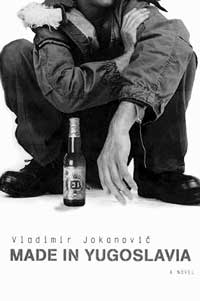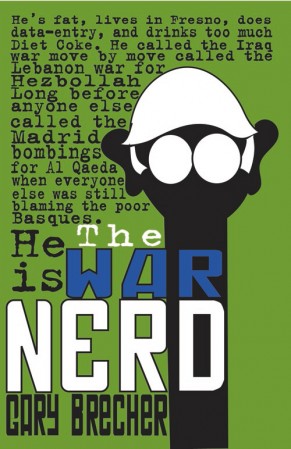
Made in Yugoslavia
By Vladimir Jokanovic
Translated by Zeljana Zovko and Cathy Porter
Picador, 2001
Ah, we’re already nostalgic for the little wars of the nineties, especially the colorful Balkan popups, with their quaint rituals and goofy flags. Remember those warm breezy days when the Balkans were popping with small-arms fire? Remember how avidly the lovable hairy villagers returned to their ancient customs, supressed by the commies? Remember those warmhearted village-to-village ambushes all day every day, except when the slivovitz hangovers made them sensitive to loud noises? It was a triumph of the human spirit, the way they nourished their village snobbery, kept it bubbling at throat-slitting temperature, through the dark years of Tito’s peace.
Novels will be revisiting these little brushfire wars for decades, now that we’re entering a phase of big no-fun 1914-style warfare. Stock in Ustashi and Chetnik will be rising every time a Cleveland strip mall gets mustard-gassed, or a bazaar in Karachi jumps to the new beat of an arclight strike. We’ll turn off the news and dream of the good old days, when buses from Hamburg and Essex let even the budget-priced tourist have a glimpse of T-62s rumbling through the orchards of Panonia.
This novel is a piece of already-belated war tourism, set in a Croatian border town. It follows three laddish — very laddish — guys who just want to drink beer and play Pogues covers in their bad band, as they are sucked down into ethnic savagery. It’s pleasant enough, taken as a piece of war tourism. There’s some decent comedy and more local color than a food tour of Tuscany.
The only problems are the unintentional comedy of this English translation, and the fact that the author wasn’t content to tell funny stories from his quaint, tiny war but felt he had to glue on a big surprise ending, with attendant “moral” on the evils of what the newspapers call “ethnic strife.”
The funny thing about “ethnic strife” — well, actually there are lots and lots of funny things about it; as the feller says in the joke, “Amn’t I the luckiest Arab in all Belfast!” — but the very funniest of all these funny things is the fact that the Arendt essaysists, the Norton-Anthology philosophes, have somehow managed to cow people (“cow” as a verb here, though the noun is also a good fit) into the absurd notion that “ethnic strife” is an anomaly.
Let’s be clear: “ethnic strife” is the norm, and the closest thing to a “universal human value” one can discover, with the possible exception of that other alleged anomaly, “Patriarchy.” If you put those things together — “patriarchy” plus “ethnic strife” — you have the ingredients of every single human culture ever studied. It’s the peace-and-solidarity vendors, Voltaire’s children, who are the anomaly, a tiny minority who have somehow claimed the norm.
So here’s this young Balkan novelist, trying to do his best to write some funny scenes of a hungover village war, but desperate to get published in the West. He can’t just tell it the way it happened. He has to tag on a moral about how wrong, how evil, how un-nice it is. And Vladimir does so, by borrowing the schlock ending of an old Irish Civil-War story, “The Sniper.” In that story, a sniper wins a long duel on the rooftops of Dublin only to discover that his opponent, whom he’s just killed, is… HIS BROTHER! Oh Jaysus Mary and the Other One, if that’s not high tragedy then I’m a hairy baboon in the Phoenix Park!
If it was good enough for Dublin, it’s good enough for Osijek, the little Croatian town where most of the novel is set. But Vladimier doesn’t simply borrow O’Connor’s lachrymose device; he updates it, via a gender switch. He sums up the 80 years of cultural change between Dublin 1920 and Osijek 1990 by making the hero kill, not his brother, but… his GIRLFRIEND! Equal opportunity! Gender balance! Yes, the Serbian hero, Luka, ends up staring down at the Croatian commando he’s just killed and realizing that it’s… it’s… Maria! Girl of his dreams and ranting psychotic Ustashe maniac! — But still a good lay, you know? And not a bad girl, really, aside from her belief that Serbs are vermin to be extirpated ASAP.
Of course, there’s another way of reading this “surprise” ending: perhaps the true moral of the story is that girls shouldn’t fight; that primitive warfare is a boy’s job. This may be the real point of the novel, because like many texts which ostensibly decry “ethnic strife,” it manages to make said strife seem like a very welcome interruption of dull, pointless lives. How many “anti-war” statements are really anti-war, anyway? Remember those Clash songs? You play those now and tell me they’re not war anthems. Those hymns to testosterone and smashed faces — tell me that’s “peace”!
The big wars are no fun, true. The one that’s coming — it won’t be fun at all. But a Balkan “strife” like the one this novel recounts can’t help but seem like an improvement on the peacetime lives of stupid village drunks. The novel begins with Ostijek at peace, with Luka, Greg, and Bili hanging around in the heat, trying to get their worthless band, The Anarchitects, going again. They have girlfriends, more or less; they have a car, sometimes; they make a lot of cool remarks and drink… and drink… and drink. Apparently we’re supposed to consider this the fun part. Which is difficult. You end up longing for the damn war to start so there’ll be a little action. What would happen if these three Balkan surfer-dudes lived on in peace? They’d drink more, they and their girlfriends would get ugly, their livers would roast, and they’d die. Roll on Death! Roll on War!
The way Jokanovic depicts the Croatian majority of Ostijek makes one impatient for the war to start, just so the reader can see these swine get their desserts. The Croatians in this novel, as in many other recent accounts, are a remarkably unattractive people, at once bloodthirsty and cowardly — rather like the way teachers and parents describe playground bullies. The trouble is that most bullies are not cowards. But the Croatians’ dismal performance in the Balkan tournaments seems to justify the characterization. The Serbs are a bit dim, but decent peasant folk and good soldiers — again, a characterization very much confirmed by recent Balkan history. Luka, the half-Serb hero, is forced out of Ostijek by Ustashe bigots, and joins the Serb militia. The Croatians, drunk on their own Ustashe rhetoric and slivovitz, attack a Serb village and are mown down with ease. Then the Croats send in their silly Ninjas, the black-clad commandos, and those two are wiped out — including that sweet li’l genocidal gal Maria.
Well, God damn it, she had it coming! It couldn’t’ve happened to a nicer girl! And that, it would seem, is the true moral of this story: don’t play tough when you ain’t got the Wehrmacht backing you any more, and don’t send a girl to do a boy’s job.
This is in fact very much a Boy’s Own story, reeking of what the Brits call “Laddishness.” And the translation only makes it worse. If you read a lot of Slavic literature in translation, you’ve encountered the problem: do Slavs speak British English or American English? This novel has been translated not only into British English but into very bad, very twee British English. Parts of the story read like Trainspotting in Transylvania, Trainspotting with a bigger body count, or The Naked Chef giving a recipe for ambushes al fresco. It’s hard to take these tough Balkan dudes seriously when they say things like, “This place could do with a clean-up” and “She’s not been around for weeks,” and “Sit down, you wanker, you haven’t a clue what life’s about!”
I could name a couple of translators who haven’t a ruddy, bloomin’ clue what idiomatic English is about, either. Sometimes the translation is not just un-idiomatic but simply wrong, as when one of our Balkan Lads says, “Man, this town will be a valley of tears.” Of course, the idiom for which the translator was groping was “vale of tears”; “valley” is, er, wrong. Again, when the lads are sitting around on a beach in the heat, one of them complains, “This is a fucking sweatshop.” Er, no, my dear translators; a “sweatshop” is a place of work. Luka and company are not working on sewing machines in a Bangladeshi factory, therefore “sweatshop” doesn’t fit. The word you wanted was “sweatbox.”
The weepy ending, the twee translation, and the instant nostalgia for the little wars of the nineties — these make for a rocky read, but not a bad one. You have to imagine what the characters are actually saying — that is, you have to read through the bad translation and imagine the correct idioms — and you have to dismiss the fake moral at the finish. But it’s worth it; the middle of this book is a good, funny account of the good old days of warfare, our heritage, our hidden norm.
This article was first published in Issue #110 of The eXile, November, 2001.
Read more: book, Books, exile issue 110, John Dolan, eXile Classic


Got something to say to us? Then send us a letter.
Want us to stick around? Donate to The eXiled.
Twitter twerps can follow us at twitter.com/exiledonline















1 Comment
Add your own1. Bruce | July 12th, 2009 at 12:37 pm
The early stages of the war nerd?
Leave a Comment
(Open to all. Comments can and will be censored at whim and without warning.)
Subscribe to the comments via RSS Feed